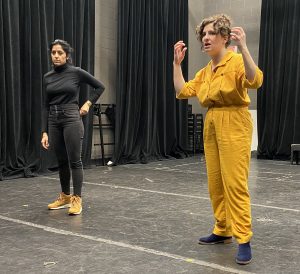
Clowning Around in Improv Class
 Even when they’re fully committed to a character, the best improvisers bring their own personalities to their performances, says improv performer Gemma Soldati ’09.
Even when they’re fully committed to a character, the best improvisers bring their own personalities to their performances, says improv performer Gemma Soldati ’09.
Soldati and her comedy partner, Amrita Dhaliwal, visited improv classes taught by Peter Parisi, a teacher in the Performing Arts Department, before spring break. The performers shared the joy and connection inherent in clowning. As students improvised chickens and horses, and took audience cues for their characters, they added telling flourishes: a Shakespearean flair, comic movement, and a confrontational “neigh.”
“These things are real; they’re part of who we are,” Soldati told the students. “You have to bring the truth of who you are to the stage. You’re not going
to be successful onstage if you’re trying to hide.”
Clowning allows performers to play with power dynamics, absurdity, poignancy, and hilarity. A good clown—in the commedia dell’arte tradition rather than the big-shoes, red-nose tradition—can be a conduit for all kinds of emotion. Soldati and Dhaliwal have toured with their two-woman show, The Living Room, in the United States and internationally, winning the Best Comedy award at the 2019 Melbourne Fringe Festival in Australia.
Playing off each other and creating a story doesn’t always result in humor, Soldati says. “It’s not a competition to see who’s the funniest. You need each other.”




